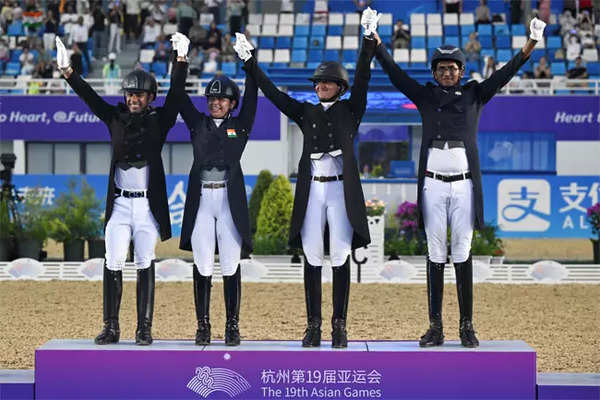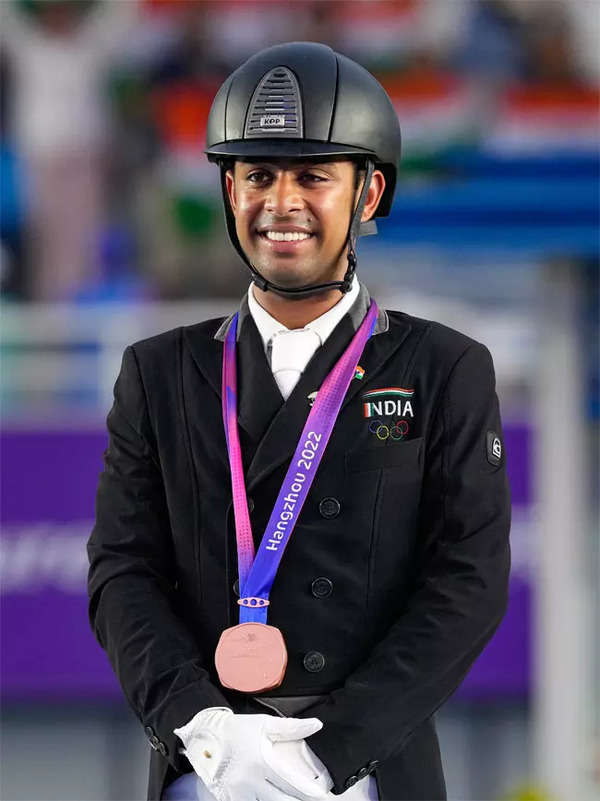Six years later, Anush, astride his horse Etro, found the perfect reply for his critics in Hangzhou.
Leading the charts for India in the team event of dressage, alongside Hriday Chheda, Divyakriti Singh and Sudipti Hajela, Anush first was part of the gold-medal winning quartet who ended a 41-year wait; and he then added a historic first individual medal for the country at the Asian Games in dressage — a bronze.
But it wasn’t as easy as that description six years ago.
Anush, a 12th-standard student back then, would fly back and forth between Germany and India to take his board examinations, while many didn’t believe he could make it big in the sport.
He went on to become the first Indian dressage rider to compete at the World Championships.
“Dealing with it was not easy,” Anush told TimesofIndia.com after the feeling of becoming India’s new equestrian star had sunk in.
(PTI photo)
“Personally, I think shifting to Germany at a young age was very difficult. I knew nobody there, I had never lived alone. Living alone in a foreign country was very difficult, I did not know the language. I faced a lot of criticism because not many people believed in me,” he further said.
Hubertus Schmidt, a dressage (team) gold medallist at the Athens Olympics in 2004, agreed to train Anush at his facility.
In a sport that is more western, European largely, an Indian training in Europe is unusual, which takes a lot of acceptance to allow one to settle and not feel left out. But it remains a requirement that an Indian equestrian athlete can’t do without.
Asian Games 2023: Anush Agarwalla wins bronze in Dressage individual event of Equestrian competition
“I was mocked a lot for my dreams because at that time I was nowhere at the (expected) level, or even close to achieving my (equestrian) dreams. Dealing with it was not easy at all,” the 23-year-old further told TimeaofIndia.com in Hangzhou.
“I made a lot of sacrifices in the sense that there were lots of days when I was alone, lots of nights when I could not sleep, which at that moment was very difficult to accept. But I never had regrets. Looking back, I am happy for everything I did, and that is what got me here.” There was a sense of contentment in his voice.
But that was not the only ‘cost’ anyone from India has to ‘pay’ to make it big in the sport.
Everything comes at a price, which is more true if you are a rider hoping to become a ‘Grand Prix’ level equestrian athlete, who has spent a considerable amount of time to develop a bond with the horse that will perform the ‘ballet’ with you at the highest stage. And it takes years to do that.
If you stay back in India to train, with all due respect to the effort of the very few equestrian academies in the country like the one in Bhopal developed by the Madhya Pradesh government, chances are that you will be left behind.
“As everyone knows, equestrian is a very expensive sport, especially coming from India, because the infrastructure, the facilities in India are not up to the mark when you compare it with the facilities in Europe,” Anush explained.
“We don’t have good enough trainers, we don’t have good enough horses, we don’t have good enough veterinary facilities, not enough shows in the year to compete. At the moment, especially in dressage, one has to shift abroad to make it big.”

(AFP photo)
The transition from the Prix St Georges (PSG) level in dressage to the Grand Prix level takes miles to travel.
PSG is where the international level of dressage competitions starts, after the rider has come up the ranks from the training level and the four levels that follow. The Asian Games competition is conducted at the PSG level while the Olympics competition is at the Grand Prix level.
“The transition in dressage from each level to the next level is huge, especially from Prix St Georges level to Grand Prix level. The whole concept changes. It’s 10 times more difficult to ride a Grand Prix than the Prix St Georges,” Anush further shared with TimesofIndia.com as he deep-dived into giving a dressage explainer.
“I don’t think our Grand Prix shows in India, not many at least, (are of top level). Just having one or two shows in the Grand Prix in a year is not enough at all,” said Anush. You compare it with Germany. They have Grand Prix level shows every week, especially in the summers.”
All that has to come together, explained Anush, to make the transition that is required if any rider dreams of Olympic-level riding.
Anush highlighted the need for accomplished trainers in India, among all the other requirements, as the most important.
“We need good trainers, good horses and also enough shows to make the transition to Grand Prix smoother. For example, if along with the government, the federation also makes efforts to organize clinics to facilitate getting in touch with good trainers, it will help young riders to make that transition, because a good trainer is the most important thing.”
He also raised a concern about the governance of the sport in the country, with the Equestrian Federation of India often finding itself embroiled in controversies, especially before a top-level competition.
Anush said the equestrian riders “received no support” from EFI when they expected them to participate in a big competition like the Asian Games.
“Leading up to the Games, what I found very disappointing and difficult was that we received no support from the federation. We faced a lot of problems, all the athletes, and this was not what I had expected leading up to a championship like the Asian Games,” he said.
“I hope the federation understands that it would be easier if we athletes focus mainly on riding and training and not on other things.”
Will a history-making Asian Games bring the change that Anush and his co-riders hope for? Only time will tell. At this point, if anything, it makes this feat even more stellar.
Watch Anush Agarwalla wins historic bronze in Dressage Individual
